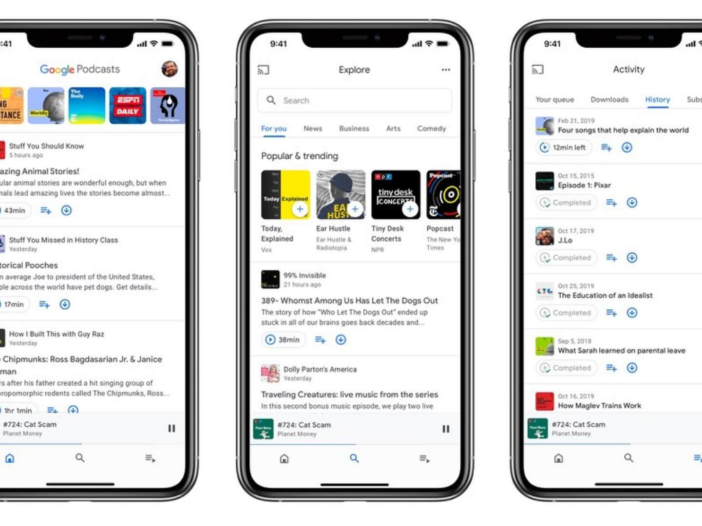Join this leadership discussion for proven techniques to build long-term relationships and keep your clients coming back.
Maximize your SEO efforts in 2024 with insights on Google’s SGE, algorithm updates, and expert tips to keep your site ahead.
Download this guide and learn how to optimize and manage Google Performance Max campaigns, with expert insights and actionable strategies to ensure your campaigns are effective.
Discover the latest trends, tips, and strategies in SEO and PPC marketing. Our curated articles offer in-depth analysis, practical advice, and actionable insights to elevate your digital marketing efforts.
Join three of Reddit’s top executives in this exclusive AMA (Ask Me Anything) to discover how you can tap into Reddit’s unique platform to drive brand growth.
Join this leadership discussion for proven techniques to build long-term relationships and keep your clients coming back.
What is the ideal number of products to feature on a webpage for ranking purposes?
Google’s John Mueller answered a question about how many product listings on a page are recommended as optimal for ranking purposes.
John Mueller suggested that the best answer could be found in considering the question from a different angle.
The person asked the question on the Mastodon social website.
He asked:
“@johnmu do you prefer an extensive product range (e.g. 30 products) on a page because offering many products is a ranking factor?
Or, would you prefer a smaller and more specific product range (e.g. 2 – 3 products) which contributes conversion more (less choice stress) in terms of E-E-A-T?”
John Mueller suggested that person asking the question should try answering the question from the perspective of usability.
Mueller answered:
“@beresterk That sounds like something I’d defer to usability-testing.”
Usability testing is a method for testing a product (or a webpage in this case) by allowing potential customers to interact with the webpage.
In a Google podcast about usability testing, Jenny Gove, a UX researcher at Google, offered these insights about the practice:
“Usability testing is like, for me, exposing the problems and exposing what works really well for users and understanding why.”
The host of the program, Mustafa Kurtuldu, Senior UX designer on Chrome (at the time), asked:
“How does someone start getting into doing research, like if they know next to nothing about it?”
Jenny answered:
“If you’re thinking about your product, as you’re sort of developing it at that stage of research, then it’s just great to get people using it for the tasks that you’re planning it for.
So even if that’s friends, family, even if that’s people in the office, it’s just great to get your product exposed to people like that so that you can watch what happens.
And in usability testing, we’re really looking for the problems people fall into and what works well for them and why it works well for them.
…you will see those things as they work through.
…And so you’ll be identifying your sort of most critical user journeys usually, and have them walk through that.
And often, it’s something like some language you use. We call that content, you know, the words you’ve got on the button or where you’ve positioned something, that just don’t make sense for most other people.”
She also suggested that friends and family testers may come with biases so it’s good at some point to test with people outside of those circles, to get a more unbiased result.
An excellent way to conduct usability testing on a website is through the use of the free Microsoft Clarity user behavior analytics tool.
The purpose of Microsoft Clarity is to show how people are interacting with a website, such as understanding how far users scroll before abandoning a webpage and other similar insights.
Microsoft published a blog post that shows how to debug website usability.
They offered three areas where Clarity helps improve usability and the user experience:
As an example, Clarity will show things like dead clicks which are an indication that users are getting hung up on a certain part of the page. Excessive scrolling is another indication of poor UX.
Circling back to the question about how many products to use on a page, the subtext of Mueller’s answer could be to identify what number of products on a page is optimal for the user.
The essence of SEO is generally seen as optimizing a webpage for ranking purposes, which means identifying what Google prefers.
So the person asking the question responded to Mueller’s suggestion by doubling down on finding out Google’s preferences.
He asked:
“@johnmu thanks for replying, appreciate it!
On behalf of conversion rate: yes!
In terms of ranking the SERP’s, what does Google prefer or what do you recommend?
Or does Google look to conversion rate in the end to decide which category page (shop) deserves a top spot in the rankings?
Am I already answering my own question?”
John Mueller responded:
“@beresterk I don’t think Google has a preference per-se.
It’s almost certain that things rank subtly differently, but that’s probably more anecdotal, and not by design.
Try it out.
I imagine the biggest effect is really on the user-side, which is more about your bottom line than anything else.”
Mueller wasn’t deflecting by advising the person to check out usability testing in order to better understand the ideal number of products to use on a webpage.
He confirmed that pages might rank differently depending on how many products are on the page, i.e. changes in the content.
But he suggested those changes are not by design, implying perhaps that it’s not a ranking signal type thing. It’s just Google responding to content.
It’s a good answer by Mueller because it’s a reminder that optimizing for Google isn’t always about how Google might respond to a change.
That may sound counterintuitive in the context of SEO but Google has a lot more signals that are related to the user experience now, such as the review system algorithm.
So it’s good to balance out the SEO by looking at a problem from the context of a user.
Read the Mastodon question and answer here:
Do you prefer an extensive product range (e.g. 30 products) on a page?
Featured image by Shutterstock/Asier Romero
I have 25 years hands-on experience in SEO, evolving along with the search engines by keeping up with the latest …
Conquer your day with daily search marketing news.
Join Our Newsletter.
Get your daily dose of search know-how.
In a world ruled by algorithms, SEJ brings timely, relevant information for SEOs, marketers, and entrepreneurs to optimize and grow their businesses — and careers.
Copyright © 2024 Search Engine Journal. All rights reserved. Published by Alpha Brand Media.
Emerging Trends in SEO: How Data-Driven Content is Shaping the Future of Digital Marketing – EIN News
Google Search Snippets Show Contradictory Information, Study Finds – Search Engine Journal
Join this leadership discussion for proven techniques to build long-term relationships and keep your clients coming back.
Maximize your SEO efforts in 2024 with insights on Google’s SGE, algorithm updates, and expert tips to keep your site ahead.
Download this guide and learn how to optimize and manage Google Performance Max campaigns, with expert insights and actionable strategies to ensure your campaigns are effective.
Discover the latest trends, tips, and strategies in SEO and PPC marketing. Our curated articles offer in-depth analysis, practical advice, and actionable insights to elevate your digital marketing efforts.
Join three of Reddit’s top executives in this exclusive AMA (Ask Me Anything) to discover how you can tap into Reddit’s unique platform to drive brand growth.
Join this leadership discussion for proven techniques to build long-term relationships and keep your clients coming back.
Google’s Featured Snippets show contradictory information from same sources based on search phrasing, new investigation reveals.
A recent investigation finds that Google’s Featured Snippets may display conflicting information from the same source material, depending on how users phrase their search queries.
This raises concerns about the search engine’s ability to interpret content accurately.
Sarah Presch, director at Dragon Metrics, discovered that Google’s Featured Snippets pull opposing statements from the same articles when users frame questions differently.
For example, searching “link between coffee and hypertension” generates a Featured Snippet highlighting caffeine’s potential to cause blood pressure spikes.
Searching “no link between coffee and hypertension” produces a contradictory snippet from the same Mayo Clinic article stating caffeine has no long-term effects.
Similar contradictions appeared across health topics, political issues, and current events.
The investigation found that asking whether a political candidate is “good” versus “bad” yields dramatically different results despite the fundamental question remaining the same.
“It’s one big bias machine,” Presch notes, explaining how Google’s algorithms appear to prioritize content that matches user intent rather than providing comprehensive, balanced information.
The findings align with internal Google documents from 2016, where engineers admitted, “We do not understand documents – we fake it.”
While Google maintains these documents are outdated, SEO experts suggest the underlying technical limitations persist.
Presch adds:
“What Google has done is they’ve pulled bits out of the text based on what people are searching for and fed them what they want to read.”
Mark Williams-Cook, founder of AlsoAsked, commented on the findings, stating:
“Google builds models to try and predict what people like, but the problem is this creates a kind of feedback loop. If confirmation bias pushes people to click on links that reinforce their beliefs, it teaches Google to show people links that lead to confirmation bias.”
These findings have implications for content creators and SEO professionals:
Google’s spokesperson defended the system, stating that users can find diverse viewpoints if they scroll beyond initial results.
The company also highlighted features like “About this result” that help users evaluate information sources.
Based on these findings, publishers should take the following actions:
As Google moves toward becoming an “answer engine” with AI-generated responses, digital marketers and content creators need to understand these limitations.
Featured Image: Song_about_summer/Shutterstock
Matt G. Southern, Senior News Writer, has been with Search Engine Journal since 2013. With a bachelor’s degree in communications, …
Conquer your day with daily search marketing news.
Join Our Newsletter.
Get your daily dose of search know-how.
In a world ruled by algorithms, SEJ brings timely, relevant information for SEOs, marketers, and entrepreneurs to optimize and grow their businesses — and careers.
Copyright © 2024 Search Engine Journal. All rights reserved. Published by Alpha Brand Media.
The Top 10 Microphones for Podcasting – Search Engine Journal
Join this leadership discussion for proven techniques to build long-term relationships and keep your clients coming back.
Maximize your SEO efforts in 2024 with insights on Google’s SGE, algorithm updates, and expert tips to keep your site ahead.
Download this guide and learn how to optimize and manage Google Performance Max campaigns, with expert insights and actionable strategies to ensure your campaigns are effective.
Discover the latest trends, tips, and strategies in SEO and PPC marketing. Our curated articles offer in-depth analysis, practical advice, and actionable insights to elevate your digital marketing efforts.
Join three of Reddit’s top executives in this exclusive AMA (Ask Me Anything) to discover how you can tap into Reddit’s unique platform to drive brand growth.
Join this leadership discussion for proven techniques to build long-term relationships and keep your clients coming back.
What’s the first step to starting a podcast? Investing in quality podcast equipment! Here are 10 perfect podcast microphones to consider.
Guess what? Podcast content is now part of Google’s SEO indexing.
That’s the good news.
The bad news is if you don’t have a podcast, you’ll miss out on a huge opportunity to gain a larger following, establish your brand, and gain authority online.
So, what’s the first step to starting a podcast?
Investing in quality podcast equipment!
To start, let’s get into the perfect podcast microphone.
Sure, you can start your podcast with your smartphone or the headset you use to make Skype calls.
You can easily upgrade to better gear down the road, right?
But think of this.
Both Apple and Spotify pay special attention to newly released podcasts.
Apple even has a section called new and noteworthy, where it highlights the best podcasts released over a two-week timeframe.
As a podcaster, this is a huge opportunity to grow your following right from the start.
But you can’t be on the new and noteworthy list with podcast content that sounds sharp and tinny.
If you hurt your listeners’ ears, even your standout content won’t make them stick around.
To do things right, start with investing in an excellent recording microphone.
Picking the microphone that’s right for you depends on where you record, how much you’re willing to spend, and the type of podcasts you’ll create.
Here are 10 from different categories.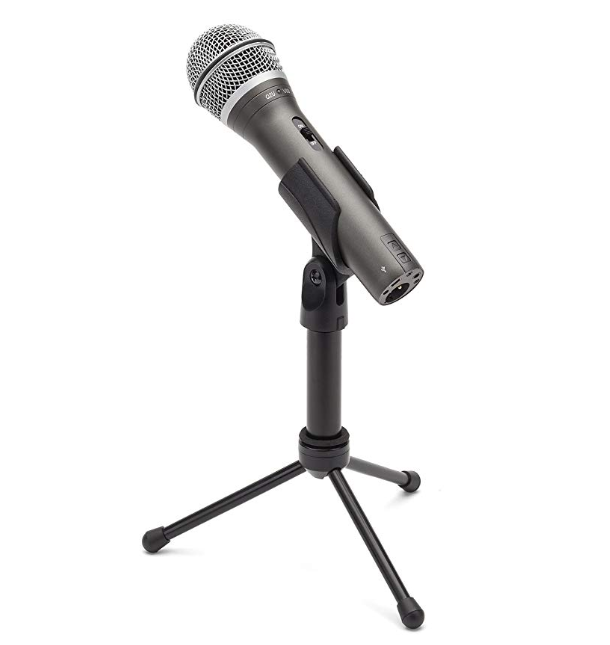
The Samson Q2U is priced below a hundred dollars, but its quality is a huge jump from what you’d get with your smartphone or headset.
Since it’s a dynamic microphone, your recordings will come out crisp and clear with minimal background noises.
You can also work with the Samson Q2U as you upgrade your podcast gear.
At the beginning, you can simply plug it into your computer through USB.
However, it also has XLR, a connector that allows pro equipment (like a digital recorder or mixer) to be connected to it.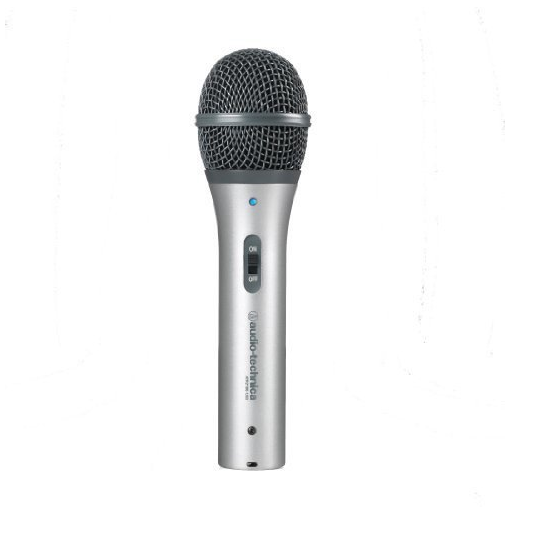
It’s an amazing device!
This is the one I personally use for everything I record, including my narration of my brand new book on Audible.
This microphone is similar to the Q2U.
It can also be connected by both USB and XLR, cancels background noises, and offers good sound quality.
When deciding over this one and the Q2U, it boils down to the microphone’s design.
The ATR2100 is brighter than the standard microphone, with a shiny aluminum body and minimalistic features.
Want to get started on condenser microphones to better catch the nuances of your voice?
At entry level, the MXL 990 is an excellent choice.
Like all condenser microphones, it captures sound in all directions, so you need to use it in a soundproof studio.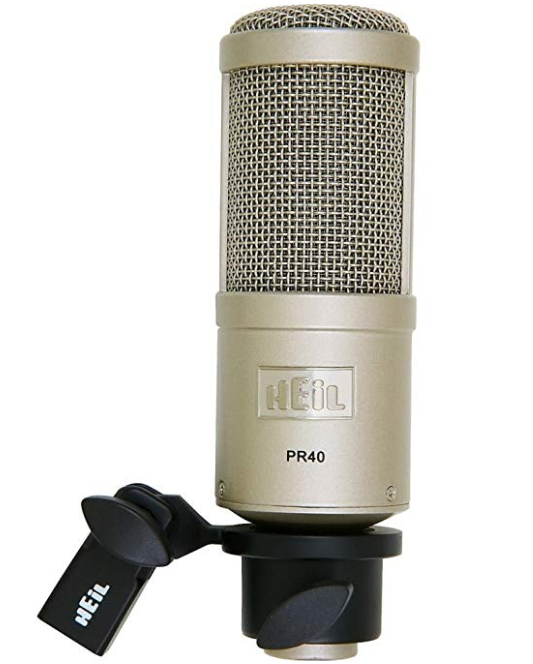
The Heil PR40 is popular with musicians because it captures a wide range of frequency.
This feature is great for podcasters because it allows the microphone to respond extremely well to the entire human vocal range.
What you get is clear, crisp, nuanced sound recordings.
Since it’s a dynamic microphone, it won’t capture a lot of background noise and you won’t have to spend hours refining your podcast episodes.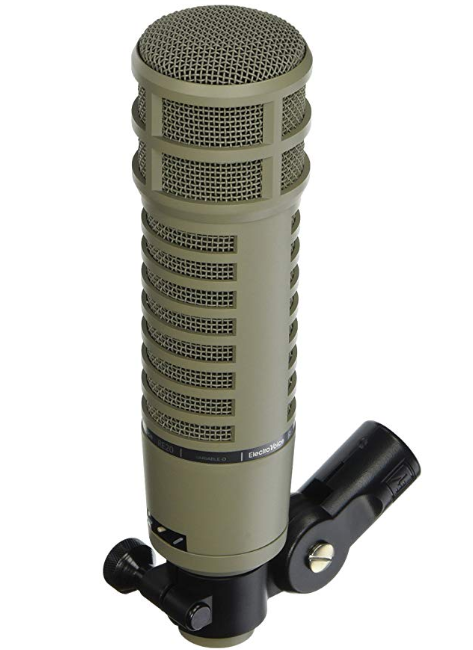
Warning: The Electro-Voice RE20 is not cheap.
It costs more than $400, and that doesn’t include the equipment it needs to function.
However, this is one of the best recording microphones out there.
It captures sound flawlessly, making your recording sound like it’s been cleaned and post-processed.
Its transient response is excellent, allowing it to quickly respond to changes in sound as it records.
It’s also extremely durable, and you don’t need to worry about moisture or heat with this solid mic.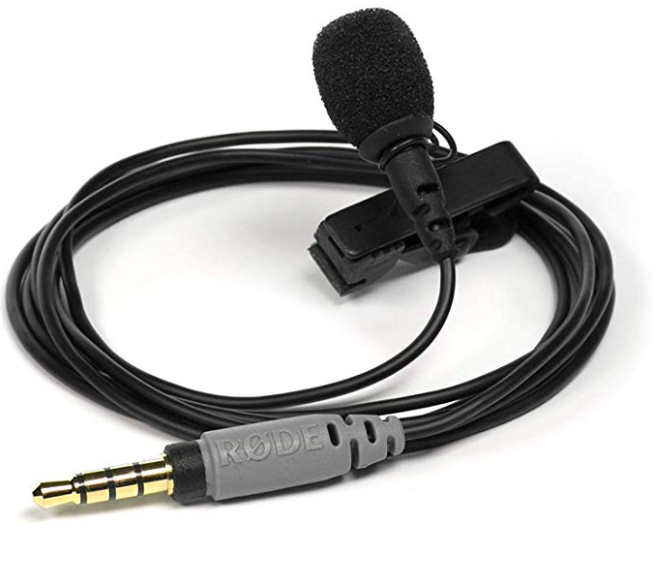
Considering its size, you’ll be surprised how good the Rode Smartlav+ sounds.
Specially designed for use with a smartphone, you can take it with you anywhere for impromptu interviews.
Simply attach the microphone to your shirt, plug the cable into your phone, and you’re ready to go!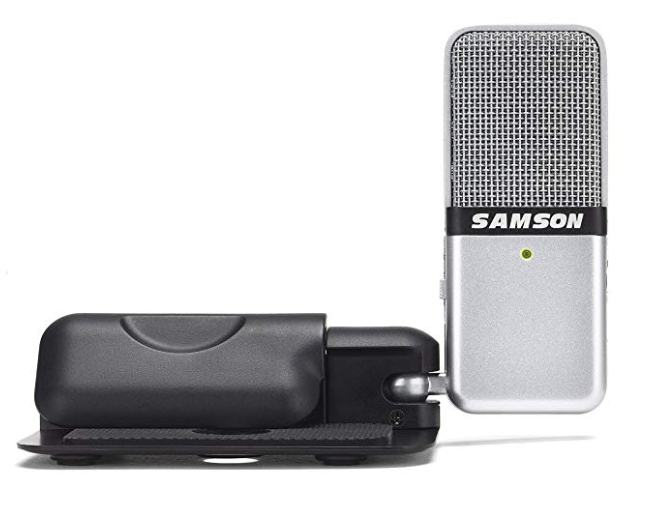
If you prefer a handheld microphone when you record podcasts on the road, the Go Portable Microphone is an excellent choice.
This microphone has an omnidirectional polar pattern, so you can use it if you’re a keynote speaker recording in a large area.
Close-up recordings also work excellently because of its cardioid polar pattern.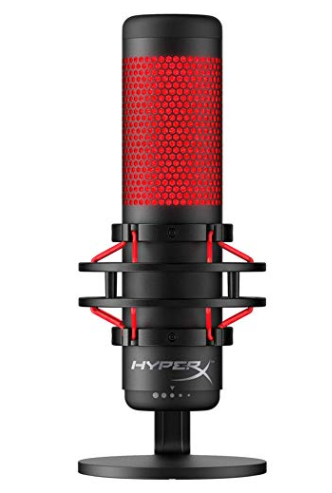
When you livestream, you don’t have time to edit your recording before it reaches your listeners.
In this case, the HyperX Quadcast microphone is the one for you.
The HyperX Quadcast microphone eliminates plosives, the hard consonant sounds like P, T, and K that cause wind noises in your recordings.
With this microphone, you can even record outdoors and still get stellar quality!
The Shure SM7b is highly esteemed by experts and audiophiles. In fact, the legendary Michael Jackson used this microphone to achieve his pristine soundtracks.
If you’re looking for a rich, warm sound, you’ll love what this mic can do for you. However, remember that it’s meant for expert use.
If you’re a beginner and have trouble with breathing noises, lip smacks, and plosive sounds, this intensely sensitive microphone is not the best for you.
The Blue Yeti microphone is great because you can use it to record group, two-person, or solo recordings.
Because it has three different condenser capsules, you can use it either indoors or outdoors. It’s also super easy to use – pull it out of its box, plug it in with either USB or XLR, and start recording!
One size doesn’t fit all when it comes to podcasting microphones. The key to picking the right one is to determine your needs.
Remember, quality sound will pay off in spades once your podcast goes live.
More Resources:
Image Credits
In-Post Image #1: Amazon.com
In-Post Image #2: Amazon.com
In-Post Image #3: Amazon.com
In-Post Image #4: Amazon.com
In-Post Image #5: Amazon.com
In-Post Image #6: Amazon.com
In-Post Image #7: Amazon.com
In-Post Image #8: Amazon.com
In-Post Image #9: Amazon.com
In-Post Image #10: Amazon.com
Julia McCoy is an 8x author and a leading strategist around creating exceptional content and presence that lasts online. As …
Conquer your day with daily search marketing news.
Join Our Newsletter.
Get your daily dose of search know-how.
In a world ruled by algorithms, SEJ brings timely, relevant information for SEOs, marketers, and entrepreneurs to optimize and grow their businesses — and careers.
Copyright © 2024 Search Engine Journal. All rights reserved. Published by Alpha Brand Media.
Google Podcasts gets a redesign and iOS rollout – Search Engine Land
sel logo
Search Engine Land » SEO » Content »
Chat with SearchBot
SearchBot:
The Google Podcast app is now available for iOS devices, and the web version of the app now supports subscriptions, the company announced Wednesday.
Google has also reorganized the app with a tabbed user interface that includes an Explore section where users are shown new show and episode recommendations related to their interests.
Podcast discovery has been a challenge for content creators with most podcast apps showing only what’s available through that particular service. Google’s aim is to provide a comprehensive resource for podcast discovery, including paid content, and library management.
The addition of subscriptions to its web app lets users more easily switch between listening on their desktops and their mobile devices, something that iTunes and Spotify users have been able to do for a long time.
As Google’s podcast platform continues to expand, it’ll become even more important for publishers to manage their presence on search.
Contributing authors are invited to create content for Search Engine Land and are chosen for their expertise and contribution to the search community. Our contributors work under the oversight of the editorial staff and contributions are checked for quality and relevance to our readers. The opinions they express are their own.
Related stories
New on Search Engine Land
About the author
Related topics
Get the newsletter search marketers rely on.
See terms.
Learn actionable search marketing tactics that can help you drive more traffic, leads, and revenue.
Online Nov. 13-14: SMX Next
Available on-demand: SMX Advanced
Available on-demand: SMX Master Classes
Discover time-saving technologies and actionable tactics that can help you overcome crucial marketing challenges.
April 15-17, 2020: San Jose
Get More Out of Your Webinars: Strategies for 24/7 Engagement
How Content is Critical to a Winning Ecommerce Strategy
ABM and AI for Marketers: Priority Use Cases for 2025
Enterprise SEO Platforms: A Marketer’s Guide
Email Marketing Platforms: A Marketer’s Guide
Customer Data Platforms: A Marketer’s Guide
Elevate Your Executive Brand with Proven Social Media Strategies
Meet your new AI-powered marketing assistant!
Get the newsletter search marketers rely on.
Topics
Our events
About
Follow us
© 2024 Search Engine Land is a Trademark of Semrush Inc.
Third Door Media, Inc. is a publisher and marketing solutions provider incorporated in Delaware, USA, with an address 88 Schoolhouse Road, P.O. Box 3103, Edgartown, MA 02539. Third Door Media operates business-to-business media properties and produces events, including SMX. It is the publisher of Search Engine Land, the leading digital publication covering the latest search engine optimization (SEO) and pay-per-click (PPC) marketing news, trends and advice.



